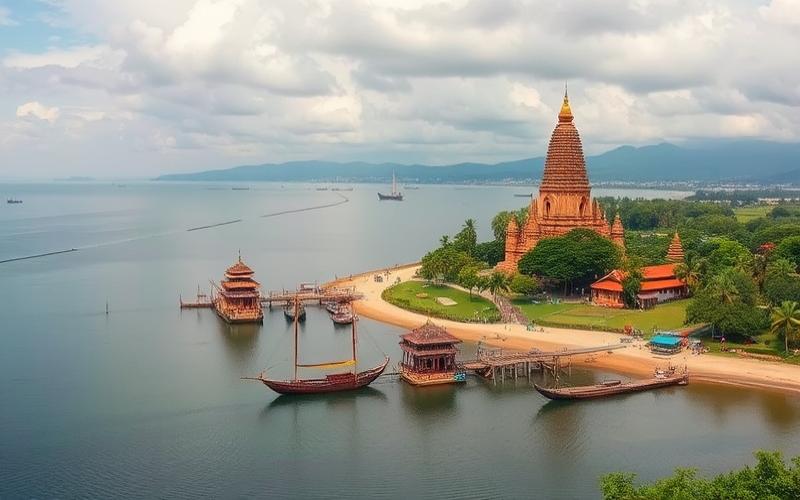
 Published on and written by Cyril Jarnias
Published on and written by Cyril Jarnias
Sri Lanka, a paradise island in the Indian Ocean, is attracting an increasing number of foreign real estate investors. With its pristine sandy beaches, rich culture, and affordable cost of living, this country offers excellent opportunities for long-term property rentals. Whether you’re looking to diversify your assets or generate rental income, here is a comprehensive guide to succeeding in your rental investment in Sri Lanka.
The Sri Lankan rental market: untapped potential
Sri Lanka’s real estate market has experienced steady growth for several years, driven by the country’s economic development and influx of tourists and expatriates. Rental demand is particularly strong in major cities like Colombo, Kandy, or Galle, as well as in coastal tourist areas.
According to data from Lanka Property Web, the country’s leading real estate website, average rents for a 2-bedroom apartment in Colombo range between $500 and $1000 per month, while a beachfront villa can rent for between $1500 and $3000 monthly. These figures of course vary depending on location and property amenities.
The long-term rental market (one-year lease or more) is particularly dynamic, driven by a clientele of expatriates, digital nomads, and foreign retirees attracted by the Sri Lankan lifestyle. This makes it an interesting segment for investors seeking regular rental income.
Good to know:
Long-term leases are generally more stable and less demanding in terms of management than seasonal or short-term rentals.
Legal framework: rules to know for worry-free renting
Before embarking on long-term rentals in Sri Lanka, it’s essential to understand the legal framework governing landlord-tenant relationships.
The Rent Act of 1972 regulates residential leases in Sri Lanka. Although some of its provisions have been relaxed, it remains the reference for real estate rentals.
Here are the main points to remember:
- Leases must be established in writing and registered with local authorities
- The minimum lease term is generally one year, renewable
- The rent amount is freely set between parties but can only be increased every 3 years
- A security deposit equivalent to 3 months’ rent is commonly required
- The landlord must maintain common areas and equipment
It’s highly recommended to consult a local specialized lawyer to draft the lease agreement and ensure compliance with Sri Lankan legislation. This will save you many inconveniences later.
Good to know:
Commercial leases are subject to specific rules, particularly regarding duration and renewal. Make sure to research thoroughly if you’re considering this type of rental.
Setting the right price: keys to attractive and profitable rent
Setting the rent is a crucial step for the success of your rental investment in Sri Lanka. Rent that’s too high may scare away potential tenants, while rent that’s too low will impact your profitability.
To determine the right price, several factors must be considered:
- Property location: rents are higher in sought-after Colombo neighborhoods or renowned beach resorts
- Size and number of rooms
- Amenities offered: pool, garden, sea view, etc.
- Overall condition of the property and its equipment
- Local competition: analyze similar listings to position yourself
Generally, monthly rent representing 0.5% to 0.8% of the property’s value is considered a good compromise between attractiveness and profitability. For example, for an apartment valued at $200,000, monthly rent between $1000 and $1600 would be appropriate.
Don’t hesitate to consult local real estate agencies or specialized websites like LankaPropertyWeb.com to get an accurate idea of rents in your area.
Good to know:
Offering rent slightly below market price can help you quickly attract quality tenants and limit vacancy periods.
Property management: keys to a harmonious relationship with your tenants
Once your property is rented, daily management of the relationship with your tenants is essential to ensure the longevity of your investment. Here are some tips for worry-free property management in Sri Lanka:
1. Establish clear rules from the start
Include all important rules regarding property use, maintenance, repairs, etc., in the lease agreement. This will prevent misunderstandings later.
2. Be responsive and attentive
Respond quickly to your tenants’ requests, whether for repairs or simple questions. This will help build a relationship of trust.
3. Respect local culture
Sri Lanka has its own cultural codes. Be sensitive to local customs and adapt your communication accordingly.
4. Plan regular visits
Organize courtesy visits to ensure proper maintenance of the property and anticipate potential problems.
5. Consider delegating management
If you don’t reside locally, hiring a property management agency can be an interesting solution. These professionals know the local market well and can effectively manage your property.
Good to know:
Implementing a secure online payment system can facilitate rent collection, especially if you don’t reside in Sri Lanka.
Investment opportunities: where and what to buy?
Sri Lanka offers numerous real estate investment opportunities, but some areas stand out particularly for long-term rentals:
Colombo and its suburbs: The economic capital attracts many expatriates and business people. The neighborhoods of Colombo 3, 4, and 7 are particularly sought after for their proximity to business centers and international schools.
Galle and the south coast: This historic and coastal region appeals to an international clientele seeking authenticity and quality of life. Renovated colonial villas are in high demand here.
Kandy: The country’s cultural capital is attracting more and more investors, particularly in the modern apartment sector.
Regarding property type, 2 to 3 bedroom apartments in secure complexes generally offer the best value for money for long-term rentals. Villas with pools also remain in high demand, particularly in tourist areas.
Good to know:
Purchasing real estate by a foreigner is subject to certain restrictions in Sri Lanka. Consult a local lawyer to learn about your options (emphyteutic lease, company formation, etc.).
Taxation and regulations: what you need to know
Investing in rental property in Sri Lanka involves complying with certain tax and regulatory obligations:
- Rental income is subject to income tax, with progressive rates ranging from 4% to 24%
- An annual property tax is due, with amounts varying by municipality
- Real estate capital gains are taxed at 10% for non-residents
- Real estate transactions are subject to registration fees
It’s highly recommended to consult a local accountant to optimize your tax situation and ensure you meet all your obligations.
Good to know:
Sri Lanka has signed tax treaties with many countries, including France, to avoid double taxation. Inquire about the provisions applicable to your situation.
In conclusion, long-term property rental in Sri Lanka can prove to be a profitable and rewarding operation, provided you prepare properly and respect the local legal framework. With rigorous management and good market knowledge, you can fully leverage the potential of this developing country.
Disclaimer: The information provided on this website is for informational purposes only and does not constitute financial, legal, or professional advice. We encourage you to consult qualified experts before making any investment, real estate, or expatriation decisions. Although we strive to maintain up-to-date and accurate information, we do not guarantee the completeness, accuracy, or timeliness of the proposed content. As investment and expatriation involve risks, we disclaim any liability for potential losses or damages arising from the use of this site. Your use of this site confirms your acceptance of these terms and your understanding of the associated risks.

















